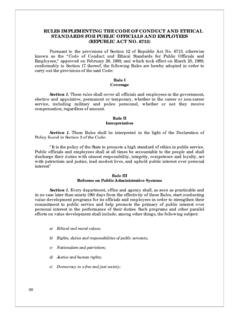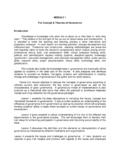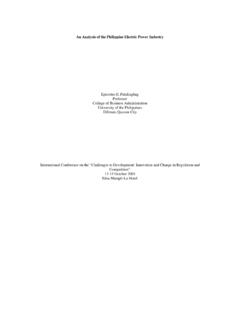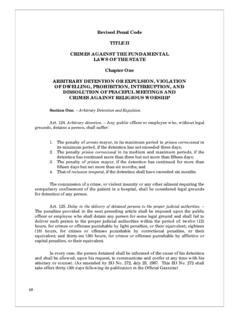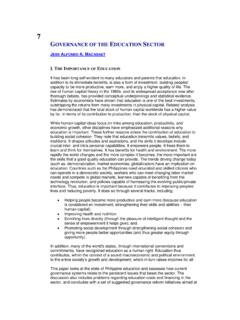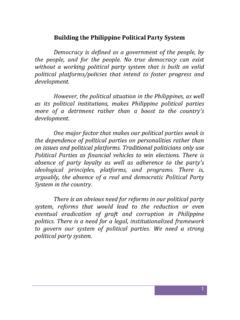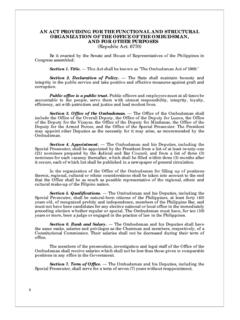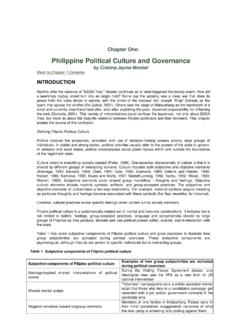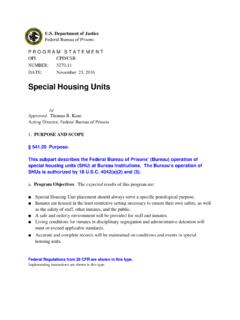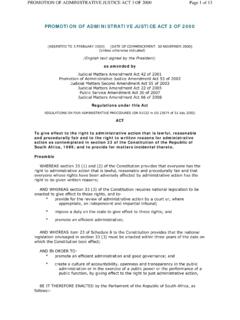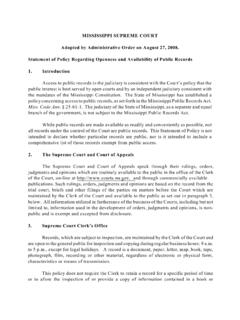Transcription of Administrative Order No. 07 RULES OF PROCEDURE OF THE ...
1 Administrative Order No. 07. RULES OF PROCEDURE OF THE. office OF THE ombudsman . Pursuant to the authority vested in the office of the ombudsman under Sections 18, 23 and 27 of Republic Act. No. 6770, otherwise known as "The ombudsman Act of 1989" the following RULES of PROCEDURE of the office of the ombudsman are hereby prescribed and promulgated: Rule 1. PRELIMINARY PROVISIONS. Section 1. Title These RULES shall be known as the RULES OF PROCEDURE . OF THE office OF THE ombudsman . Section 2. Coverage These RULES shall apply to all criminal and Administrative complaints, grievances or requests for assistance and such other matters cognizable by the office of the ombudsman . Section 3. Form of complaints, grievances or requests for assistance. Complaints may be in any form, either verbal or in writing. For a speedier disposition of the complaint, however, it is preferable that it be in writing and under oath.
2 A complaint which does not disclose the identity of the complainant will be acted upon only if it merits appropriate consideration, or contains sufficient leads or particulars to enable the taking of further action. Grievances or requests for a assistance may likewise be verbal or in writing. In any case, the requesting or complaining party must indicate his address and telephone number, if any. Rule II. PROCEDURE IN CRIMINAL CASES. Section 1. Grounds A criminal complaint may be brought for an offense in violation of 3019, as amended, 1379 as amended, 6713, Title VII, Chapter II, Section 2 of the Revised Penal Code, and for such other offenses committed by public officers and employees in relation to office . Section 2. Evaluation Upon evaluating the complaint, the investigating officer shall recommend whether it may be: a) dismissed outright for want of palpable merit.
3 B) referred to respondent for comment;. c) indorsed to the proper government office or agency which has jurisdiction over the case;. d) forwarded to the appropriate office or official for fact-finding investigation;. e) referred for Administrative adjudication; or f) subjected to a preliminary investigation. Section 3. Preliminary investigation; who may conduct. Preliminary Investigation may be conducted by any of the following: 83. 1) ombudsman Investigators;. 2) Special Prosecuting Officers;. 3) Deputized Prosecutors;. 4) Investigating Officials authorized by law to conduct preliminary investigations or 5) Lawyers in the government service, so designated by the ombudsman . Section 4. PROCEDURE The preliminary investigation of cases falling under the jurisdiction of the Sandiganbayan and Regional Trial Courts shall be conducted in the manner prescribed in Section 3, Rule 112 of the RULES of Court, subject to the following provisions: a) If the complaint is not under oath or is based only on official reports, the investigating officer shall require the complainant or supporting witnesses to execute affidavits to substantiate the complaints.
4 B) After such affidavits have been secured, the investigating officer shall issue an Order , attaching thereto a copy of the affidavits and other supporting documents, directing the respondents to submit, within ten (10) days from receipt thereof, his counter-affidavits and controverting evidence with proof of service thereof on the complainant. The complainant may file reply affidavits within ten (10) days after service of the counter- affidavits. c) If the respondents does not file a counter-affidavit, the investigating officer may consider the comment filed by him, if any, as his answer to the complaint. In any event, the respondent shall have access to the evidence on record. d) No motion to dismiss shall be allowed except for lack of jurisdiction. Neither may a motion for a bill of particulars be entertained. If respondents desires any matter in the complainant's affidavit to be clarified, the particularization thereof may be done at the time of clarificatory questioning in the manner provided in paragraph (f) of this section.
5 E) If the respondents cannot be served with the Order mentioned in paragraph 6 hereof, or having been served, does not comply therewith, the complaint shall be deemed submitted for resolution on the basis of the evidence on the record. f) If, after the filing of the requisite affidavits and their supporting evidences, there are facts material to the case which the investigating officer may need to be clarified on, he may conduct a clarificatory hearing during which the parties shall be afforded the opportunity to be present but without the right to examine or cross-examine the witness being questioned. Where the appearance of the parties or witnesses is impracticable, the clarificatory questioning may be conducted in writing, whereby the questions desired to be asked by the investigating officer or a party shall be reduced into writing and served on the witness concerned who shall be required to answer the same in writing and under oath.
6 G) Upon the termination of the preliminary investigation, the investigating officer shall forward the records of the case together with his resolution to the designated authorities for their appropriate action thereon. 84. No information may be filed and no complaint may be dismissed without the written authority or approval of the ombudsman in cases falling within the jurisdiction of the Sandiganbayan, or of the proper Deputy ombudsman in all other cases. Section 5. Cases falling under the jurisdiction of municipal trial courts.. Cases falling under the jurisdiction of the office of the ombudsman which are cognizable by municipal trial courts, including those subject to the Rule on Summary PROCEDURE may only be filed in court by information approved by the ombudsman or the proper Deputy ombudsman . Section 6. Notice to parties. The parties shall be served with a copy of the resolution as finally approved by the ombudsman or by the proper Deputy ombudsman .
7 Section 7. Motion for reconsideration - a) Only one motion for reconsideration or reinvestigation of an approved Order or resolution shall be allowed, the same to be filled within five (5). days from notice thereof with the office of the ombudsman , or the proper Deputy ombudsman as the case may be, with corresponding leave of court in cases where information has already been filed in court;. b) The filing of a motion for reconsideration/reinvestigation shall not bar the filing of the corresponding information in Court on the basis of the finding of probable cause in the resolution subject of the motion. (As amended by Administrative Order No. 15, dated February 16, 2000). *RULE III. PROCEDURE IN Administrative CASES. Section 1. Grounds for Administrative complaint. An Administrative complaint may be filed for acts or omissions which are: a) contrary to law or regulations.
8 B) unreasonable, unfair, oppressive or discriminatory;. c) inconsistent with the general course of an agency's functions though in accordance with law;. d) based on a mistake of law or an arbitrary ascertainment of facts;. e) in the exercise of discretionary powers but for an improper purpose;. f) otherwise irregular, immoral or devoid of justification;. g) due to any delay or refusal to comply with the referral or directive of the ombudsman or any of his deputies against the officer or employee to whom it was addressed; and h) such other grounds provided for under 292 and other applicable laws. * As amended by Administrative Order No. 17, dated September 7, 2003. 85. Section 2. Public officers covered; exceptions. - All elective and appointive officials of the government and its subdivisions, instrumentalities and agencies, including Members of the Cabinet, local governments, government-owned or controlled corporations and their subsidiaries are subject to the disciplinary authority of the office of the ombudsman .
9 Excepted from the foregoing are Members of Congress, the Judiciary, and officials removable only by impeachment; provided, however, that the office of the ombudsman may investigate any serious misconduct in office allegedly committed by officials removable only by impeachment for the purpose of filing a verified complaint for impeachment, if warranted. Section 3. How initiated. An Administrative case may be initiated by a written complaint under oath accompanied by affidavits of witnesses and other evidence in support of the charge. Such complaint shall be accompanied by a Certificate of Non- Forum Shopping duly subscribed and sworn to by the complainant or his counsel. An Administrative proceeding may also be ordered by the ombudsman or the respective Deputy ombudsman on his initiative or on the basis of a complaint originally filed as a criminal action or a grievance complaint or request for assistance.
10 Section 4. Evaluation. Upon receipt of the complaint, the same shall be evaluated to determine whether the same may be: a) dismissed outright for any of the grounds stated under Section 20 of RA. 6770, provided, however, that the dismissal thereof is not mandatory and shall be discretionary on the part of the ombudsman or the Deputy ombudsman concerned;. b) treated as a grievance/request for assistance which may be referred to the Public Assistance Bureau, this office , for appropriate action under Section 2, Rule IV of this RULES ;. c) referred to other disciplinary authorities under paragraph 2, Section 23, RA. 6770 for the taking of appropriate Administrative proceedings;. d) referred to the appropriate office /agency or official for the conduct of further fact-finding investigation; or e) docketed as an Administrative case for the purpose of Administrative adjudication by the office of the ombudsman .
